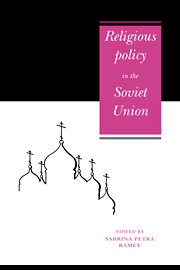Book contents
- Frontmatter
- Contents
- Notes on contributors
- Preface
- Part I Introduction
- Part II Policy apparatus
- Part III Education, socialisation, and values
- 6 Fear no evil: schools and religion in Soviet Russia, 1917–1941
- 7 Soviet schools, atheism and religion
- 8 The Ten Commandments as values in Soviet people's consciousness
- 9 Out of the kitchen, out of the temple: religion, atheism and women in the Soviet Union
- Part IV Cults and sects
- Part V The world of Christianity
- APPENDIX: Religious groups numbering 2,000 or more, in the USSR
- Index
7 - Soviet schools, atheism and religion
Published online by Cambridge University Press: 03 December 2009
- Frontmatter
- Contents
- Notes on contributors
- Preface
- Part I Introduction
- Part II Policy apparatus
- Part III Education, socialisation, and values
- 6 Fear no evil: schools and religion in Soviet Russia, 1917–1941
- 7 Soviet schools, atheism and religion
- 8 The Ten Commandments as values in Soviet people's consciousness
- 9 Out of the kitchen, out of the temple: religion, atheism and women in the Soviet Union
- Part IV Cults and sects
- Part V The world of Christianity
- APPENDIX: Religious groups numbering 2,000 or more, in the USSR
- Index
Summary
What has been the rationale of traditional atheistic education in the USSR? First, atheism being part and parcel of the Marxist–Leninist worldview on which communist education was based, atheistic education was an indispensable underpinning component of communist education. Second, the very fact of religion's survival meant the existence of an alternative ideology or ideologies representing a dangerous challenge to CPSU hegemony. The identification of nationalism with religious affiliation was a striking case in point. The challenge was essentially intolerable and had to be fought. Third, religion was not merely a system of ideas or a manner of thinking, any more than Marxism–Leninism was; both were systems of belief which were supposed to lead to the formation of attitudes and result in patterns of behaviour involving the ability to distinguish between right and wrong and to choose the better action. Although in certain instances the outcomes were similar, in other respects they were fundamentally different, and so religious morality was regarded as an insidious alternative to communist morality. It was an important task of atheistic education to expose this.
Such was the position up to 1988, when within two months there could be detected the earliest shaking of the foundations of policy structures in both education and religion. They had already been jogged. Even before the historic CPSU plenum of January 1987 had set the pace of political perestroika, a group of innovatory educators had launched their ‘pedagogy of cooperation’ based on new, trustful relationships between teachers, children, and parents. Later in 1987 Soviet newspapers started to publish appeals for the reopening of churches.
- Type
- Chapter
- Information
- Religious Policy in the Soviet Union , pp. 158 - 186Publisher: Cambridge University PressPrint publication year: 1992

